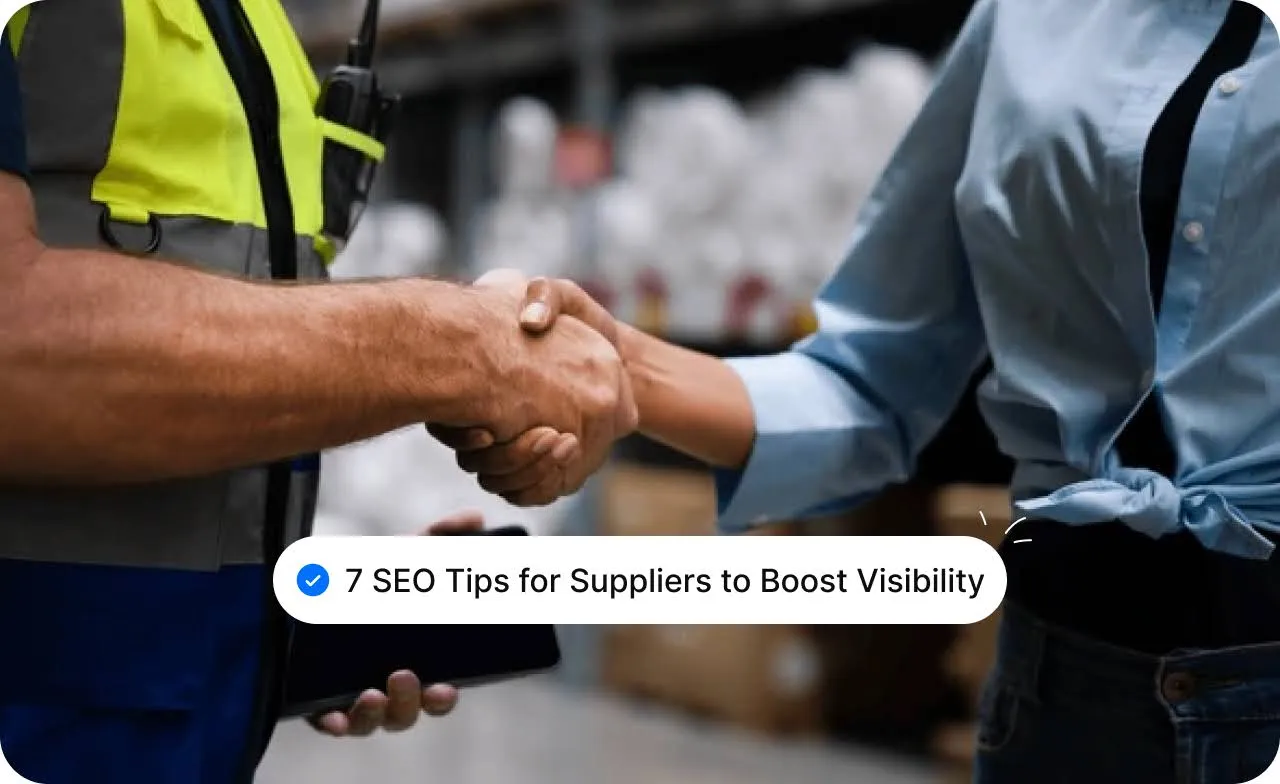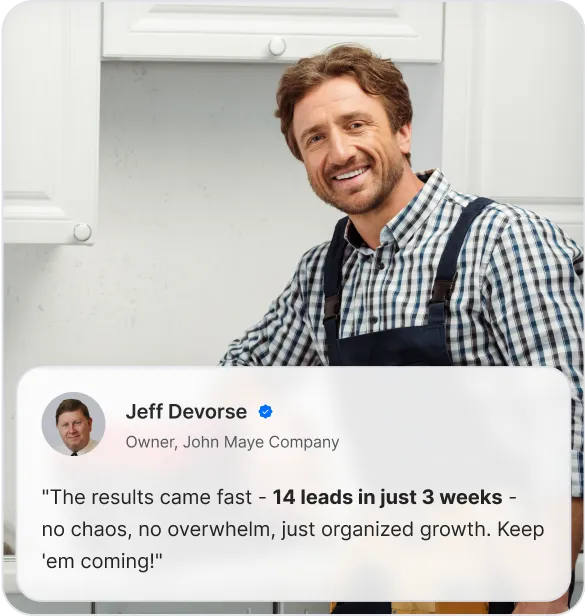Ever searched for a supplier online and only called the first two results you saw? Your buyers do the same.
The difference is, they’re not just looking for a name. They’re judging whether you feel credible, capable, and worth their time in a matter of seconds. A confusing website, unclear product details, or weak structure can quietly push you off their list before any real comparison even begins.
SEO changes that moment. It shapes how your business appears, how easily buyers understand your offering, and whether they move forward or move on. When it’s done well, it improves how seriously your business is taken.
In this guide, you’ll find seven essential SEO tips designed specifically for suppliers who want to stand out clearly, earn buyer confidence faster, and turn searches into real enquiries.
What SEO Really Does for Suppliers?
SEO helps suppliers show up where buyers search and makes it easier for them to evaluate your capabilities. It’s not about chasing trends. It’s about giving procurement teams, distributors, and manufacturers the information they need in a format they trust.
Here’s what strong SEO for suppliers delivers:
- Clarity: Buyers quickly see what you supply, your specs, and the industries you serve.
- Discoverability: Your pages appear for the exact terms tied to your products or materials.
- Trust: Detailed product info, certifications, and case examples help you look credible immediately.
- Better enquiries: More of your traffic comes from people who actually need what you offer.
This foundation sets you up to apply the seven tips that follow, making your visibility stronger and your enquiries more qualified.
Essential 6 SEO Practices Manufacturers Must Master
Strong SEO for manufacturers rests on a balanced mix of smart keyword targeting, valuable content, technical precision, and ongoing optimisation. These core practices work together to improve visibility, attract the right buyers, and build long-term authority in competitive markets:
1. Keyword Research
Effective keyword research is the cornerstone of SEO. For manufacturers, this means identifying and targeting the search terms that best reflect the problems your products solve.
Don't focus on generic keywords; instead, hone in on long-tail keywords that capture the specificity of your business.
Targeting What Matters:
- Use Google Keyword Planner, SEMrush, and Ahrefs to uncover the keywords driving traffic in your industry.
- Focus on long-tail keywords such as “custom CNC parts for automotive manufacturing” instead of generic terms like “metal parts.”
2. Content That Converts
Manufacturers must create content that resonates with both their audience and search engines. Your content should directly address customer pain points, while also showcasing your industry knowledge.
Whether it's a blog post or a product page, content that educates and informs positions you as a trusted leader.
Crafting Compelling Content:
- Blogs: Offer valuable insights into the manufacturing process or industry trends.
- Case Studies: Show how your products solve specific problems for clients.
- Product Pages: Highlight your offerings’ features and benefits in a way that speaks to buyers’ needs.
3. Building Links
Backlinks are critical to SEO success. They signal to Google that your website is credible and relevant. For manufacturers, getting backlinks from industry publications, directories, and high-quality blogs boosts your authority and improves search engine rankings.
Authority Through Backlinks:
- Partner with industry blogs for guest posts or features.
- Get listed in reputable directories and associations.
- Share case studies or original research that attract media mentions.

4. Technical SEO
Technical SEO ensures that your website is optimized behind the scenes. It covers everything from page load speed to mobile optimization, ensuring that users (and Google) can access your site easily and quickly.
From Mobile Optimization to Speed:
- Use Google PageSpeed Insights to test and optimize your site’s loading times.
- Make sure your site is mobile-friendly, as an increasing number of users browse on smartphones.
Tools to Use: Google PageSpeed Insights, Screaming Frog, and GTmetrix.
5. Local SEO
If your manufacturing business serves specific locations, local SEO is crucial. Optimize your website for regional searches to ensure local clients can find your business when searching for suppliers near them.
Dominate Your Local Area:
- Optimize your Google My Business listing with up-to-date contact info, images, and descriptions.
- Use localized keywords like “metal fabrication in Detroit” or “custom parts in California.”
- Encourage reviews on local platforms to build trust and credibility.

6. Tracking Results
SEO is an ongoing effort. To maximize your ROI, you need to track key metrics and adjust your strategy accordingly. Use tools like Google Analytics and Google Search Console to monitor your site's performance.
The Metrics That Matter:
- Traffic: Monitor organic search traffic to gauge SEO impact.
- Conversions: Track how many visitors turn into leads or sales.
- Keyword Rankings: Keep an eye on how your target keywords are performing.
Tools to Use: Google Analytics, Google Search Console, Ahrefs, and SEMrush.
Common SEO Mistakes to Watch Out For
SEO is an ongoing effort, but even small mistakes can significantly hinder your progress. Here are the most common SEO pitfalls suppliers should avoid to stay ahead of the competition. Avoid common errors:
Keyword Stuffing
- Mistake: Overloading content with keywords.
- Solution: Use keywords naturally within relevant content. Prioritize long-tail, industry-specific terms.
Neglecting Mobile Optimization
- Mistake: A non-mobile-friendly site can drive users away.
- Solution: Ensure your site is responsive and optimized for mobile browsing.
Ignoring Site Speed
- Mistake: Slow websites harm user experience and rankings.
- Solution: Optimize your site’s speed using tools like Google PageSpeed Insights and improve load times.
Overlooking Technical SEO
- Mistake: Issues like broken links or poor site structure affect rankings.
- Solution: Conduct regular technical SEO audits to fix issues like broken links and improve crawlability.
Not Updating Content Regularly
- Mistake: Outdated content leads to lower rankings.
- Solution: Update content regularly to ensure freshness and relevancy, like adding new product details or industry insights.
Neglecting User Experience (UX)
- Mistake: Poor navigation and design hurt site engagement.
- Solution: Focus on intuitive site design and ensure visitors can easily find what they need.
Ignoring Local SEO
- Mistake: Missing out on local customers and suppliers.
- Solution: Optimize Google My Business and use location-based keywords to improve local visibility.
Failing to Track SEO Performance
- Mistake: Without monitoring, you won’t know what’s working.
- Solution: Use Google Analytics and Google Search Console to track key metrics and adjust your SEO strategy.
By avoiding these SEO mistakes, you can enhance your site’s performance, attract the right leads, and stay competitive in your industry. Optimize for success and watch your supplier business thrive.
Why SEO Should Be Your Go-To Strategy for Growth?
In a competitive market, suppliers often struggle to stand out. With SEO, you can make sure your business gets found by potential customers who are actively searching for products or services like yours.
SEO is about connecting with the right audience at the right time and building your brand's credibility.
Why SEO Matters for Suppliers?
- Increased Visibility: High search engine rankings put you in front of customers at the moment they're searching for what you offer. Sites on the first page of search results receive 75% of clicks.
- Attract Quality Leads: SEO helps you target intent-driven keywords, meaning you attract customers who are already interested in what you sell, leading to more qualified leads.
- Long-Term Results: Unlike paid ads, SEO delivers sustained visibility with minimal ongoing costs.
- Builds Trust and Credibility: Appearing at the top of search results establishes your brand as an authority in your industry, building trust with potential buyers.
SEO is essential for suppliers to gain visibility, attract qualified leads, and stay competitive. By investing in SEO, you can ensure your brand stands out in a crowded market and reaches the right audience when it matters most.
Ready to Step Up Your Supplier SEO Game?
As a supplier, simply hoping to attract more traffic isn’t enough; you need targeted visibility and qualified leads to drive real business results. SEO for suppliers is a proven approach to long-term growth.
By focusing on the right keywords, creating valuable content, optimizing for local search, and building credibility through backlinks, you can ensure your brand rises above the competition and gets noticed by the right people.





















.webp)








.webp)
.svg)


.svg)
.svg)
.svg)




.svg)


